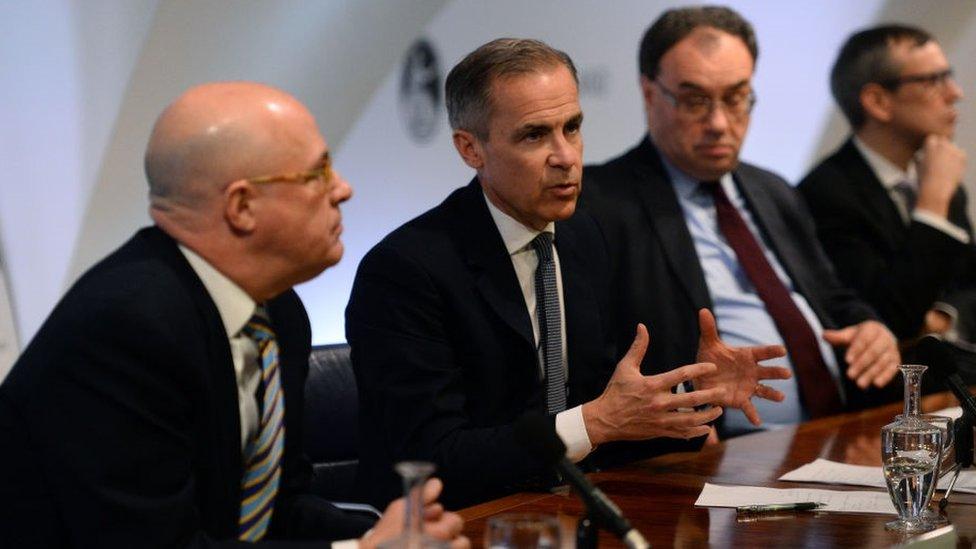Wanted: New Bank of England boss
- Published

The government has launched the recruitment process for a new governor for the Bank of England.
The current governor Mark Carney will step down on 31 January 2020 after more than six years in the post.
For the first time the government has hired a recruitment firm - Sapphire Partners - to help with the search.
The job description, external has been placed on the public appointments website. The annual salary is £480,000 - unchanged since 2013.
It states that candidates must be able to demonstrate the ability to lead "a complex and powerful financial institution".
Interviews will be held over the summer and the appointment will be made by the government in the autumn.
"Finding a candidate with the right skills and experience to lead the Bank of England is vital for ensuring the continuing strength of our economy and for maintaining the UK's position as a leading global financial centre," the chancellor said in a statement.

Who is in the running?

With the Bank of England governor's job being crucial when it comes to our financial wellbeing, it is likely that approaches to candidates are already being made behind closed doors.
The chancellor has previously speculated that the ongoing uncertainty over Brexit might put off some applicants. But it's still a prime job - with a base salary of £480,000.
There's no shortage of potential internal candidates - such as Bank Deputy Governor Ben Broadbent or Chief Economist Andy Haldane.
Then there's former Deputy Governor Andrew Bailey, and former rate-setter Nemat Shafik.
But the use of a firm of headhunters for the first time implies the chancellor is keen for this to be a wide sweep of talent in what is, after all, the world's financial capital - and he is under pressure to consider more female candidates.
And, as with the incumbent, the search could go beyond our borders.
Raghuram Rajan, a former head of India's central bank, is another name that's been touted. But given the current political situation, the next governor is almost certain not to hail from elsewhere in the EU.

'Advocates for women'
On its website,, external the recruitment firm Sapphire Partners, which been employed to carry out the search describes itself as "advocates for women in business", and it is run by five female partners.
Sapphire's appointment could be seen as an attempt to quell criticism over gender diversity.
Last May, the Bank's failure to appoint another woman to its Monetary Policy Committee (MPC) was described as "truly staggering".
Currently the nine-strong MPC - which votes on interest rate decisions each month - has only one female member.
Foreign candidate?
The job description also emphases the ability to inspire confidence "on the international stage", and experience at a financial institution such as the Bank for International Settlements or the International Monetary Fund.
The preference for international experience suggests the Bank could be looking for a foreign candidate.
Last September, the Treasury confirmed that Mr Carney would extend his term until 2020, saying it would support a "smooth exit" from the European Union.
Officially the post is for eight years, but Mr Carney agreed to a five-year term with the option of a further three.
Mr Carney has "helped steer the UK economy through a challenging period," Mr Hammond said.

Mark Carney has been governor of the Bank of England for more than six years
"Under Mark's leadership the Bank of England has been at the forefront of reforms to make our financial system safer and more accountable," he added.
The Bank of England governor wields immense power in the UK financial system, as they can influence the course of interest rates and also set priorities for the Bank in managing risks to the financial system.
The Bank governor is the chair of the three central committees at the Bank of England:
The Monetary Policy Committee which sets interest rates
The Financial Policy Committee which monitors risks in the financial system
The Prudential Regulation Authority which regulates financial firms
Last year Mr Carney, who is Canadian, received total pay of £881,574. That included an accommodation allowance of £250,000, which the Bank says reflects the difference in the cost of living in London rather than Ottawa.